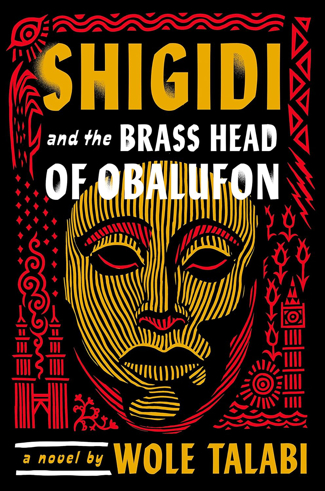I recently became aware of the term “godpunk.” It’s a science fiction/fantasy sub-genre that sits alongside such sub-genres as “steampunk” and “solarpunk.” While “steampunk” imagines a story set in a Victorian-like milieu and “solarpunk” imagines positive outcomes in a future with climate change, “godpunk” tells stories about the world’s deities their close associates, such as angels and demons. Often these stories are set in a time period outside of the classic stories of these gods. What’s more, while these stories can be humorous or offer wry commentary, they endeavor to be respectful of the traditions represented. Examples of this sub-genre include Neil Gaiman’s American Gods and Silvia Morena-Garcia’s Gods of Jade and Shadow. I recently dove into Wole Talabi’s godpunk novel Shigidi and the Brass Head of Obulafon.
The novel opens with a chase on the streets of the “spirit side” of London. Shigidi, recently the Yoruba peoples’ god of nightmares, is in a cab with the Succubus Nneoma. He’s lost an arm and they’re being chased by a giant on a makeshift chariot being pulled by enchanted bronze horses. They’ve just stolen the Brass head of Obalufon, a relic which has been displayed at the British Museum and hope to deliver it to the powerful Yoruba god Olorun. At last Nneoma confesses her love for Shigidi. From here, the novel goes back in time to tell us how we reached this point.
In Talabi’s cosmos, gods live on prayers and worship. The gods of the world have separated themselves into corporations that control different parts of the world. Christianity and Islam are the megacorps of this world. The Yoruba gods are a sizeable, but smaller company fighting to survive and some gods have already faded away. When we reach back in time, we find that Shigidi is a rather ugly god who people pray to so he’ll give their enemies nightmares bad enough to kill them. One night, while on the job, he meets the succubus Nneoma. Although she comes from the Christian side of the cosmos, she’s an independent contractor, doing what succubi do, using sex to steal souls. She encourages Shigidi to go independent with her. When he agrees, she reforms him into a beautiful god. It looks like things are going to go well, but as with many indie operators, they find they have to work in a world dominated by the corporations. They fall afoul of some of the wrong gods, they begin to owe favors to others, and at last, Olorun comes to them with an offer they can’t refuse, steal the Brass Head of Obalufon and they’ll have it made.
Talabi takes us on a wild ride that ranges from Nigeria to Malaysia to London, weaving the elements from the distant and near past that brought Shigidi and Nneoma to the point we meet them at the start of the novel. Infamous spiritualist Aleister Crowley even comes along for part of the ride. Along the way, we see human-like jealousy, love, anger, and vengeance writ large as only the gods can do. I thought this was a fun novel and it’s made me curious to learn more about the Yoruba gods and their influence on world culture.
For myself, I’ve only really dipped my toe into the godpunk waters once. This is in the story “Dusty Violet and Bleached Bones” which appears in the anthology It Came From Her Purse, edited by Terrie Leigh Relf and Marcia A. Borell. The story features a smackdown between the Kachina Crow Mother and La Llorona. You can find the story at https://www.amazon.com/Came-Purse-Terrie-Leigh-Relf/dp/1087882079/
It would be fair to ask if my Scarlet Order Vampire novels count as godpunk with their angels, gods, and Kachinas. While some of the aliens of this world may have inspired a few specific legends, my characters in this series are aliens whose egos are big enough that they’re content with being seen as gods and other powerful beings. Despite that, fans of the genre might find the novels close enough to be interested in reading more. You can learn about the Scarlet Order Vampire novels at: http://davidleesummers.com/books.html#scarlet_order
